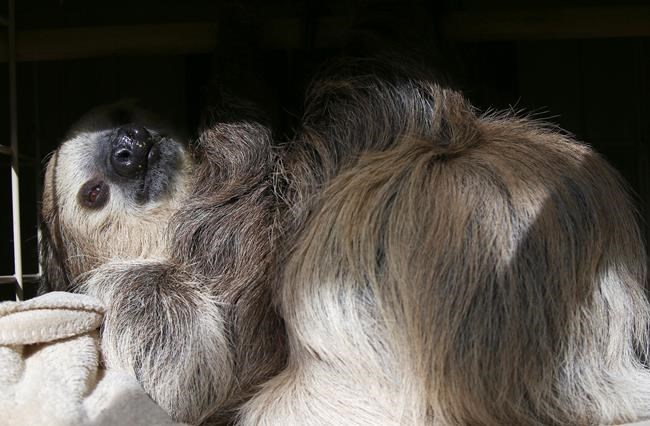
Fernando, the two-toed sloth, falls asleep inside his habitat at the Phoenix Zoo Monday, April 27, 2020, in Phoenix. A prominent animal rights group is calling for the end of using animal words as insults. THE CANADIAN PRESS/AP, Ross D. Franklin
January 30, 2021 - 7:00 AM
A prominent American animal rights group wants people to stop using animal words as insults.
People for the Ethical Treatment of Animals (PETA) tweeted earlier this week that calling someone a "chicken," "rat" or "pig" degrades animals by applying negative human traits to them.
"(It) reinforces the myth that humans are superior to other animals and justified in violating them," PETA said. "Stand up for justice by rejecting supremacist language."
The group listed alternative words people should use such as "lazy" instead of "sloth" or "jerk" instead of "snake."
The tweet sparked backlash and ridicule online with one person responding: "Can I still call my boyfriend a tiger in bed or will it make humans feel sexually inferior?"
"I half wonder if PETA secretly hates animals, and this is a clever plan to make animal protection groups look stupid," another user wrote in a tweet that received thousands of likes.
As absurd as PETA's position may seem to some, Martin Guardado, a professor at the Department of Linguistics at the University of Alberta, said it's obvious why the organization is focusing on language.
"Language is often thought of as a tool for communication, as a tool for describing and naming things, but it's much more than that," said Guardado.
"Advocacy groups recognize that language can help implement their agendas and reach their goals."
Words have power, he said, which people know from their daily lives.
"We use the right words at the right time, and we can uplift someone or make them more depressed."
This isn't the first time PETA has brought the fight to the way in which we speak.
In 2018, the organization targeted popular idioms it said were rooted in "speciesism" and "anti-animal language."
PETA suggested people say "feed two birds with one scone" instead of "kill two birds with one stone." It also wanted people to say "taking the flower by the thorns" instead of "taking the bull by its horns."
The Virginia-based organization has also asked dictionaries to change some of their definitions.
"PETA is calling on Merriam Webster, Dictionary.com and others to help combat speciesism and reduce animal abuse by removing derogatory definitions of pigs, snakes, and dogs," PETA has said.
The organization referred to two particular examples, where dog is defined as a "despicable man or youth" and a pig as a "dirty, gluttonous or repulsive person."
Guardado said he doesn't know if PETA's efforts will stick, but adds there is a growing animal rights movement that has the potential to influence how we express ourselves.
"Language and culture are tightly connected and they are often seen as one and the same," he said.
"When values change, language needs to change with that. There's no stopping it."
This report by The Canadian Press was first published Jan. 30, 2021.
News from © The Canadian Press, 2021